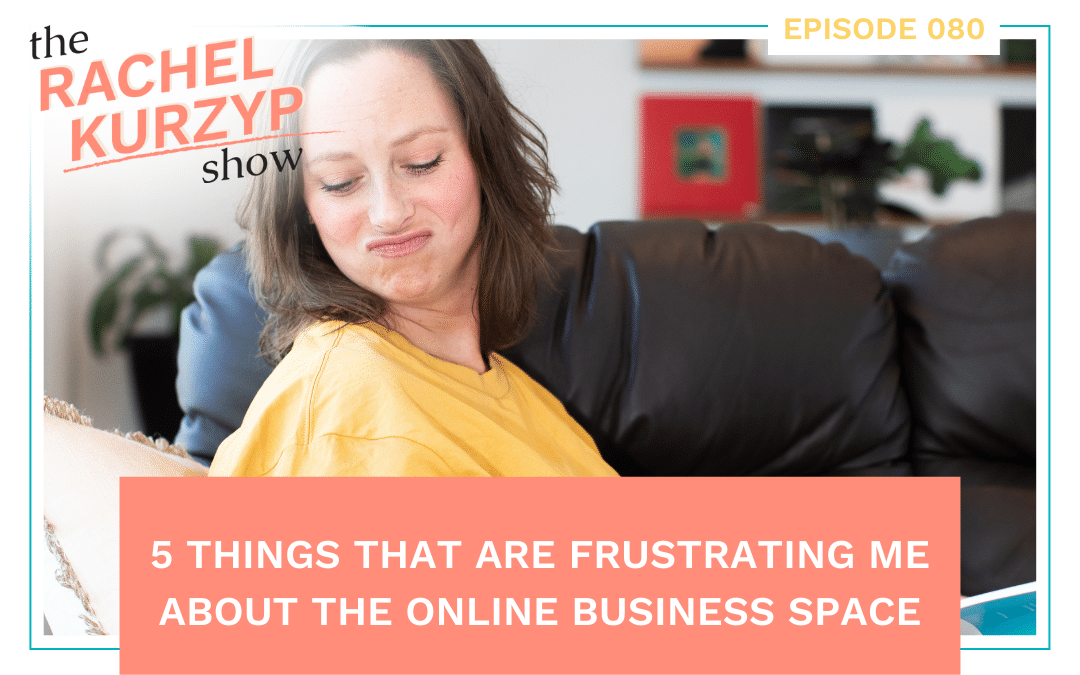Welcome to The Rachel Kurzyp Show.
Today I want to share 5 things that are frustrating me about online business right now and what I’m doing about it.
And um and ah’d about sharing this episode with you because no one benefits from a negative Nancy. So I promise this isn’t a whinge fest.
However, I do think there is value in sharing, talking and discussing the not so warm and fuzzy things that have been coming up for me so that if you’ve been feeling the same way, you know you’re not in this alone.
And so you can see how I lean into these frustrations and use them as a guide to where I should be focusing my time, energy and creativity.
Something I’ve accepted recently is that I can’t continue to sit back and expect others to lead the changes I want to see in the online business space.
I believe that if something keeps coming up for you (for example I keep being triggered by the rags to riches stories being used to sell programs) that you have be given an opportunity to change the narrative. And as always, it’s your choice if you choose to pursue it.
I don’t want to keep you hanging, so let’s dive into the 5 things that are frustrating me about the online business space right now.
1. For and against business advice
When I hear business owners telling their community that they shouldn’t offer sales calls or the only way to grow your income is to stop supporting clients 1:1 I remind myself that many of us have been taught that the only way to become known in our space and establish our expertise is to make bold and controversial claims. Which isn’t the case.
Some creators are even going so far as creating rage bait so they can use the engagement to boost the reach of their profile because Instagram and YouTube’s algorithm don’t distinguish between positive and negative engagement.
Advice like this is generic, out-dated and doesn’t add value to the conversation. For every business owner who doesn’t offer sales calls there will be one who does. And their reasons are going to be different.
So don’t listen to For and Against advice unless the business owner explains why they have made this decision or take this approach. Context in this case is everything.
This is why I’m going to continue providing context where relevant in all my communications and why I never tell my clients that they should or shouldn’t do something. That’s not my job.
2. Social media platforms prioritising video first content
The educator in me is particularly concerned with the the changes we’re seeing on Instagram because not everyone learns best watching an 8 second video. Many people still need to read something to take it in. Which is why captions are so important.
I also work with many neurodiverse business owners who have shared with me that the loud music and flashing text is causing them to feel overstimulated and is contributing to sensory overwhelm.
And as a creator, I now feel the pressure to put myself – my face and body – front and center in my marketing and I know many others are feeling this pressure too.
I can’t change the social media landscape but I can be aware of the challenges and find new and innovative ways to create content. Over the coming weeks I’ll be trialing some speaking to camera content on Instagram and sharing more content on email so my community can continue to engage with my content in the written form. Stay tuned for this one.
3. Unethical rags to riches sales tactics
As someone who has experienced homelessness, has worked for one of the largest banks in Australia, written about financial literacy and has jumped two income brackets in a generation (an OECD report in 2018 stated it normally takes 4 generations in Australia to go from poor to meeting in average wage), I feel I am uniquely placed to speak to the rags to riches story trope.
Using the rags to riches trope in your marketing is unethical. I stand firm on this. I’m disgusted at how many business owners are sharing stories of how they bought their second beach front property thanks to their decision to spend their last dollar on a coach 12 months prior.
Or how they had no money to their name but believe in their business idea so much that they maxed out their credit card and now have a multi-six figure business.
Many defend their actions by saying they aren’t telling their clients to do the same. My answer to this is, then why share this aspect of your story if it isn’t necessary – which it isn’t.
It’s the same as influencers who share what they eat in a day videos and start the video with a picture of their abs. No they aren’t directly recommending people follow their diet to have abs but they are implying it and this the same thing.
I can’t control what people share on the internet but I can add to the narrative. So that’s what I’m going to do. I’ve shared my story before on numerous media platforms and in publications. And I’m pitching to business podcasts so I can speak on this topic – if you’d like me to speak on your pod, send me a DM on Instagram.
I’ve talked about bro marketing on the show quite a few times and I’ll leave links in the show notes to these episodes. I’d encourage you to go and listen to them. The more we understand why these tactics are unethical and make us feel gross the more influence we will have over our buying behaviour. These tactics are being used because they get the sale but if we stop buying, these business owners will finally need to take a look at sales practises.
4. Performative leadership (and business)
What is performative leadership? I define it as when a business owner says the ‘right’ thing and acts the ‘right way’ to build the know, like and trust factor but actually has no intention of taking action or changing their behaviour.
We’re seeing this a lot in the Diversity, Equity and Inclusion where celebrity business owners have no intention of being allies. For example, saying it’s important to pay your employees a living wage but continues to outsource all work to business owners in the Philippines and pays them $5 USD and hour for their time so they can continue to profit from others expertise and time.
Another way I’m seeing performative business is through manufactured authenticity where business owners are selling programs in their bathtub or on a tropical beach sipping cocktails and this is meant to make them relatable when in fact, they’re constructing an image of themselves that isn’t real as I mentioned in the point above.
To be honest, I’m not even sure the business owners who are being performative realise what they are doing. I think in most cases they are emulating others in the hope of having the same success.
If you’ve been following me for a while you’d know I speak to what it means to be a modern expert a lot, and this isn’t going to change. I’m going to also start speaking more to how you can avoid the performative business trap and define what authentic leadership means to you.
5. Vague AF messaging
Quantum leaps, 5D desire, high-ticket, next level I could go on. What the fudge do these words even mean? Have I been guilty of using vague messaging and buzzwords. Definitely.
Using industry specific words and messaging is normal and many of us do it instinctively as way to demonstrate that we are a member of a group and establish a sense of belonging.
However, I do feel that the online business space is starting to take it too far. Like I actually laugh out loud when I see some of these terms being used in a sentence.
Interestingly, when buzzwords pop up in my clients copy, I ask them to define the word for me and 50% of the time they can’t and realise they are using it simply because everyone else is.
Jargon can create a disconnect between you and your clients so for many businesses, it’s having the opposite desired effect. It’s also terrible for branding and sales.
That’s why I’m supporting my clients to prioritise clear messaging over clever copy and trying my hardest to ditch industry jargon even if it means I’m not seen as one of the cool kids.
Which of these 5 things are frustrating you? And what are you doing about it? Send me a dm on Instagram at rachel_kurzyp and let me know.
And before I wrap up this episode, I want to let you know that I have two 1:1 coaching spots left for the month of May. Currently my coaching program is 3 months long but after May it will a 6 month program due to the feedback I have received from my clients.
So if you know you want my support, guidance and accountability over the next three months as you continue to build your profitable business, head to rachelkurzyp.com.au/coaching to book in a call.
Thanks so much for tuning into today’s episode.
If you’ve found what I’ve shared valuable please leave a review and hit the subscribe button so you don’t miss when a new episode drops every Wednesday.
Resources and Links:
Book in a call to learn more about my 1:1 coaching
Website: rachelkurzyp.com.au
Instagram: @rachel_kurzyp
What does an aligned and profitable business look like for you? Take the quiz. https://rachelkurzyp.com.au/quiz





